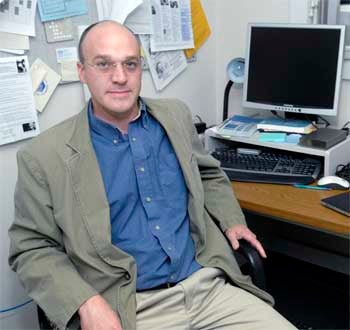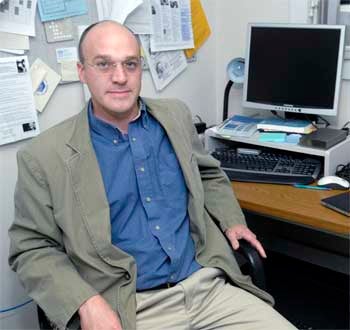 KINGSTON, R.I. — November 27, 2006 — When contemporary health professionals conduct long-term intensive studies to describe what drives addictive behaviors such as smoking, their studies produce tremendous amounts of data.
KINGSTON, R.I. — November 27, 2006 — When contemporary health professionals conduct long-term intensive studies to describe what drives addictive behaviors such as smoking, their studies produce tremendous amounts of data.
To help analyze those data and characterize critical processes underlying addiction, University of Rhode Island Assistant Professor of Behavioral Science Theodore Walls has received an award from the American Cancer Society (ACS) to develop new quantitative models. These models will be based on the integration of models used in engineering and the physical sciences with statistical approaches used typically in behavioral science.
Specifically, the five-year American Cancer Society Mentored Research Scholar Grant for $594,000 is to develop new dynamical models to describe self-regulation in addiction, particularly in the case of smoking behavior. Walls will utilize data collected with the use of real-time tools — the Internet, cell phones, and other electronic sensors of biomarkers – to characterize factors such as the urge to smoke, mood, and actual smoking events for different types of smokers. A recent increase in the number of real-time studies being conducted has created the rich pool of data about the behavior of smokers that are needed for dynamic models.
“The missing link in helping us to learn from these studies is the family of analytical models needed to decode those data and extract from them information that can then be used to define prevention and treatment strategies for various types of addiction,” Walls explained. He will work with leading faculty at URI and substance abuse scientists in several countries to develop “the next wave of quantitative models” for smoking and other health behavior studies.
The new project leverages Walls’ extensive background in developmental psychology and statistical modeling of long-term study data. Serving as joint mentors for the award are Drs. Wayne Velicer, Department of Psychology/CPRC at URI and Raymond Niaura, Butler Hospital/Brown Medical School. Other colleagues who will assist with aspects of the new model development include David Chelidze, University of Rhode Island; James Ramsay, McGill University; Daniel Rivera, Arizona State University; Michael Rovine, Penn State; Joseph Schafer, Penn State; and Saul Shiffman, University of Pittsburg.
Walls, who joined the University of Rhode Island psychology faculty just over two years ago, has established a lab devoted to the study of behavioral processes involving graduate students Andrew Sorkin and JaeJoon Song and undergraduates Mike Furtado, Katie Fischer, Alexandra Mancini, and Kylie Tanner in 2005. Projects underway in the lab in its second year include collaboration with Drs. Rich Rende and Cheryl Slomkowski at Brown University Medical School on a study that considers the daily smoking behavior of adolescent siblings. The current award will allow him to extend activities with these students and develop new studies of the processes of addiction.
A resident of Westwood, Massachusetts, Walls is the editor of a recent book on statistical models for intensive longitudinal models and author of numerous professional journal articles. Prior to his appointment at URI, he was a research scientist at the Yale University School of Medicine and a post-doctoral fellow at the Methodology Center at Penn State. He was also a 2004 recipient of an award for the study of diverse lives from the Murray Archive at the Institute of Quantitative Science, Harvard University. He holds a PhD. from Boston College and a B.A. from Bates College.
Research funding from the American Cancer Society’s research portfolio has produced forty Nobel laureates since 1913, more than any other non-profit organization. The Cancer Society’s mentored research scholar grant supports mentored research by full-time faculty, typically within the first four years of their appointment, with the goal of becoming independent investigators in clinical, cancer control and prevention, epidemiologic, psychosocial, behavioral, health services and health policy research.
URI News Bureau Photo by Michael Salerno Photography

